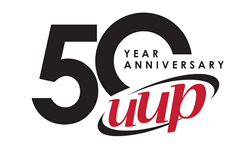
For Immediate Release
April 22, 2021
At a dynamic, wide-ranging roundtable discussion hosted by United University Professions, a consensus of environmental experts, policymakers, and entrepreneurs called for the need for progressive policy and legislative action—including passage of the Climate and Community Investment Act.
During today’s virtual Earth Day roundtable, discussions also centered on environmental challenges and opportunities facing New York and how SUNY can be a catalyst to help meet those challenges. The panel talked about the importance of employing green energy technology and reducing waste, and the cost of addressing climate change.
SUNY can lead the way as the state moves toward sustainable energy sources, in part by adopting UUP clean energy initiatives to retrofit SUNY buildings for renewable energy, expand and create green energy degrees and training programs, and set up a series of microgrids on campuses.
“SUNY is uniquely positioned to lead the way in meeting the goals set forth in the state’s Climate Leadership and Community Protection Act,” said UUP President Fred Kowal. “From offering cutting-edge green energy courses and degrees, to educating the green energy workforce of today and tomorrow, to positioning itself as a world leader in researching and combatting the climate crisis, SUNY has a major role to play.”
Kowal, a member of the National Wildlife Federation’s board of directors, moderated the event. State Assembly member Steve Englebright was a panelist, as were Jessica Ottney Mahar, New York policy and strategy director for The Nature Conservancy; Dennis Elsenbeck, president of Viridi Parente and a New York State Climate Action Council member; Stephan Edel, coalition coordinator for New York Renews; Susan Fassler, sustainable facilities manager at SUNY ESF; and Peter Iwanowicz, executive director of Environmental Advocates of New York and also a member of the New York State Climate Action Council.
Fassler, a UUP member, said she’d like to see SUNY adopt a zero waste initiative to reduce the amount of waste discarded by campuses. She said that SUNY ESF is working to reduce the waste it throws away by 90 percent.
“This won’t make splashy headlines, but it will make a difference behind the scenes,” she said.
Panelists talked about UUP’s sustainability proposals in its New York HEALS (Health care, Education, Access, Leadership, Sustainability) plan, including retrofitting SUNY buildings to make them more energy efficient and using renewable energy resources such as solar, wind and geothermal energy. SUNY’s carbon footprint is large; roughly 40% of state-owned buildings and structures are on SUNY campuses.
Englebright said SUNY could and should take the lead in retraining the workforce for a green economy. UUP, in its NY HEALS plan, calls on SUNY to expand and create green energy course offerings and degree programs.
“We are going to need to transition the workforce and the workforce will need to be retrained,” Englebright said. “We need a place to go for reliable information, and that is going to be SUNY in New York. Higher education helps us identify the problem and helps us in many ways going forward, most importantly in workforce training.”
Elsenbeck referenced his company’s Green Machine line of electric construction equipment—mini excavators, skid steer loaders and electric light towers—that are powered by powerful rechargeable batteries. The Buffalo-based company maintains that its machines represent 10 to 18 metric tons of tailpipe carbon offset.
“It’s going to take all of us to solve the (climate crisis) problem, and SUNY can be one of our greatest leaders in how that can be done,” Elsenbeck said.
Panelists also considered UUP’s plan for a pilot program to set up a series of energy microgrids and battery storage locations on campuses. The microgrids would generate and store clean energy, which could be used to power campus buildings and vehicles; people living in communities that host SUNY campuses could also tap into the microgrids.
“Now is the time for academia to take up this important role to create a world that our children and grandchildren should have and deserve,” said Kowal. “This is about our future and the future of our planet.”
A Facebook Live recording of the forum can be viewed at https://www.facebook.com/uupinfo/videos/3411691815597644.
-30-

